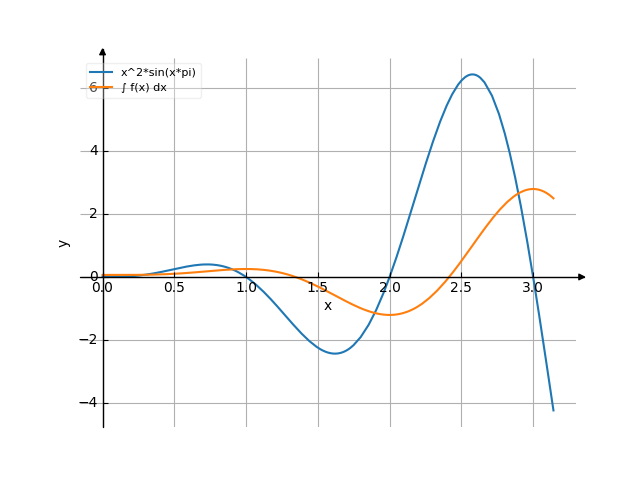Integral of x^2*sin(x×pi) dx
The solution
pi / | | 2 | x *sin(x*pi) dx | / 0
-
Use integration by parts:
Let and let .
Then .
To find :
-
Let .
Then let and substitute :
-
The integral of a constant times a function is the constant times the integral of the function:
-
The integral of sine is negative cosine:
So, the result is:
-
Now substitute back in:
-
Now evaluate the sub-integral.
-
-
Use integration by parts:
Let and let .
Then .
To find :
-
Let .
Then let and substitute :
-
The integral of a constant times a function is the constant times the integral of the function:
-
The integral of cosine is sine:
So, the result is:
-
Now substitute back in:
-
Now evaluate the sub-integral.
-
-
The integral of a constant times a function is the constant times the integral of the function:
-
Let .
Then let and substitute :
-
The integral of a constant times a function is the constant times the integral of the function:
-
The integral of sine is negative cosine:
So, the result is:
-
Now substitute back in:
-
So, the result is:
-
-
Now simplify:
-
Add the constant of integration:
The answer is:
/ | 2 | 2 2*cos(pi*x) x *cos(pi*x) 2*x*sin(pi*x) | x *sin(x*pi) dx = C + ----------- - ------------ + ------------- | 3 pi 2 / pi pi
/ 2\ / 2\
2 / 2\ 2*sin\pi / 2*cos\pi /
- --- - pi*cos\pi / + ---------- + ----------
3 pi 3
pi pi
=
/ 2\ / 2\
2 / 2\ 2*sin\pi / 2*cos\pi /
- --- - pi*cos\pi / + ---------- + ----------
3 pi 3
pi pi

Use the examples entering the upper and lower limits of integration.

![Find the integral of y = f(x) = x²*sin(x×pi) dx (x squared multiply by sinus of (x× Pi)) - with detailed solution [THERE'S THE ANSWER!] x^2*sin(x×pi)](/media/krcore-image-pods/176/hash/indefinite/4/e0/43756b0d94f0bc573e6df31d297f0.png)
 Integral of exp(7*x)*sin(x)
Integral of exp(7*x)*sin(x)
 Integral of 1/sqrt(x^2+1)
Integral of 1/sqrt(x^2+1)
 Integral of 6x^5
Integral of 6x^5
 Integral of 1/(x+1)^3
Integral of 1/(x+1)^3